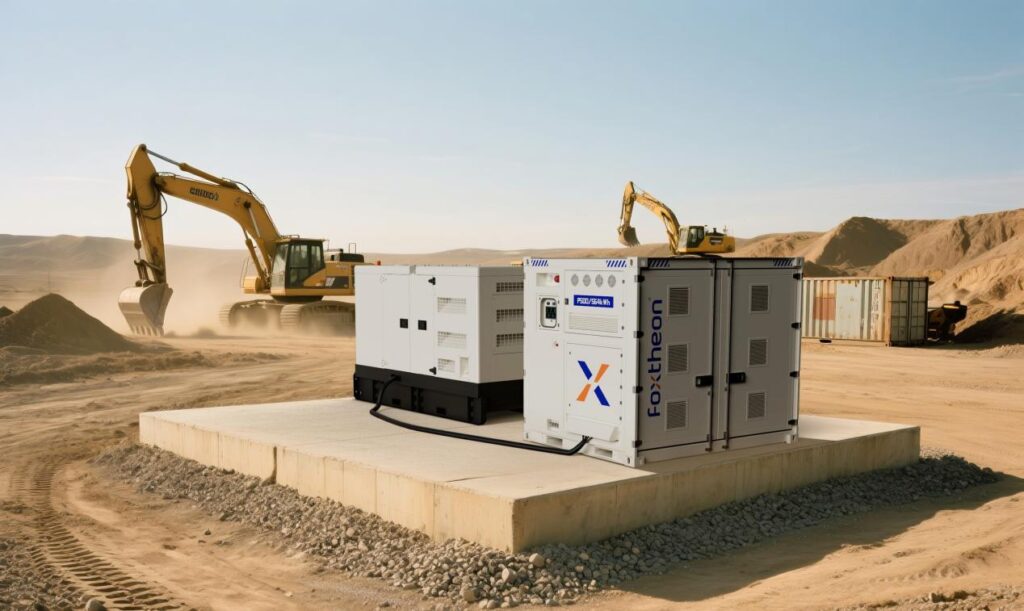As construction projects expand into remote areas and scale in complexity, the demand for effective off-grid electric systems is growing rapidly. From temporary power solutions for construction that run heavy equipment to systems supporting site offices and worker accommodations, dependable electricity is crucial for operational efficiency and safety.
This article explores the key challenges in off-grid power supply for construction sites, offering insights to help project managers, engineers, and contractors make informed decisions for their energy strategies.

High Operating Costs from Diesel Dependence
Many construction sites currently rely on diesel generators for their primary off-grid power, a common yet expensive choice. This dependency leads to several financial and operational burdens, impacting the total cost of ownership for off-grid power.
Rising Fuel Costs
Fluctuating diesel prices directly increase operational costs. Diesel generators, while cheaper upfront, incur ongoing fuel expenses, with the average construction site spending thousands of dollars each month on fuel. This burden is especially heavy for construction sites that consume large fuel volumes, particularly in remote locations where fuel delivery is costlier and more complex.
Emissions & Compliance
Diesel generators emit a variety of harmful pollutants, including nitrogen oxides (NOx), particulate matter (PM), carbon monoxide (CO), sulfur oxides (SOx), volatile organic compounds (VOCs), and carbon dioxide (CO2)[1]. These emissions result in air pollution, climate change, and growing public health concerns.
As environmental regulations become increasingly stringent, such emissions are leading to higher compliance costs and potential fines. For example, there have been cases where companies faced penalties exceeding $27,000 for surpassing allowable NOx emission limits and failing to submit mandatory emission reports[2].
Hidden Maintenance and Waste Costs
Beyond direct fuel expenses, diesel-powered systems incur substantial hidden costs. These include frequent diesel generator maintenance costs due to wear and tear, energy wasted when generators run inefficiently at low loads (idle energy waste), and the labor involved in refueling. All these elements significantly contribute to the lifetime operational expenses.
The steep operating costs associated with diesel generators underscore the urgent need for more economical and sustainable energy solutions.
Unpredictable Power Load Management and Scalability Issues
Off-grid power systems on construction sites struggle to cope with constantly shifting power demands due to inherent technical and operational limitations.
Highly Fluctuating Energy Demand
Construction activities result in highly variable energy consumption, with significant peaks during operations like welding, crane lifts, or concrete pouring. This makes managing peak loads on construction sites a primary concern.
To avoid outages, crews often oversize their temporary power supply for construction sites, leading to substantial fuel waste and inflated operating costs.
Lack of Real-Time Monitoring and Control
The absence of live energy tracking means site managers can easily miss critical demand spikes or equipment overloads. This results in inefficient energy utilization and contributes to unplanned downtime.
Limited Scalability with Project Growth
Many static power setups lack the flexibility to adapt to evolving project needs. As a site expands, this forces either costly system upgrades or the deployment of additional parallel units, reducing efficiency.
These constraints highlight the critical need for more adaptive, scalable temporary power and intelligent energy management solutions, such as hybrid power systems for construction.
Energy Reliability and Costly Downtime Risks
The stability of an off-grid power supply can be compromised by various factors, such as insufficient sunlight for solar systems during overcast periods or winter, leading to depleted battery storage.
Power Interruptions and Equipment Damage
This instability frequently causes power interruptions, particularly during peak demand periods when heavy machinery is operational, leading to significant project delays.
Moreover, power fluctuations and poor quality supply can damage sensitive electronic equipment, necessitating expensive repairs and replacements. Effective, reliable backup power is essential for preventing downtime from power issues on construction sites.
Financial Impact of Downtime
Ultimately, any downtime resulting from an unstable or inadequate off-grid power supply translates into substantial financial losses. These encompass project delays, consequential additional labor costs, and urgent equipment repair expenses.
Studies show that power outages can increase firm costs by 15% or more due to lost productivity and other inefficiencies[3]. In time-sensitive industries like construction, even brief interruptions can ripple through project timelines and budgets.
For example, in multifamily construction, power outages have caused delays of 60 to 90+ days in utility connections[4]. These delays can translate into millions of dollars in added costs and postponed occupancy—creating significant pressure on project ROI and delivery schedules.
Without robust backup planning, such as integrating reliable battery storage or advanced hybrid systems, construction sites often find themselves overly reliant on expensive diesel generators, further driving up operational costs.

Overcoming Off-Grid Power Challenges with Foxtheon
Foxtheon directly addresses the complex challenges of off-grid power supply on construction sites by offering innovative and reliable solutions engineered for continuous, efficient operations.
If you’re seeking a robust hybrid power system for construction that integrates an off-grid power generator with advanced LiFePO4 lithium-ion battery storage, the Foxtheon EnergyPack P350/P500 is engineered specifically for these demanding environments. Designed to deliver dependable off-grid energy, the EnergyPack P350/P500 effectively tackles critical on-site power challenges.
Reliable Performance in Demanding Environments
Featuring durable, long-lasting LiFePO4 batteries, the EnergyPack P350/P500 operates consistently even in heavy-duty construction environments, providing stable, high-quality power for equipment such as tower cranes and drilling machines.
Significant Cost Reduction
By seamlessly integrating with renewable energy sources like solar, EnergyPack systems drastically reduce reliance on diesel generators. This translates to a reduction in fuel consumption and harmful emissions for construction projects by cutting generator runtime by up to 80%, leading to substantial savings on fuel and reduced generator maintenance needs.
Intelligent Load Management
The proprietary FoxMind™ intelligent hybrid power management system dynamically optimizes energy distribution between generators, battery storage, and photovoltaic (PV) input, ensuring a flexible and immediate response to varying power loads and peak demands.
Unmatched Flexibility and Scalability
With a modular, plug-and-play design, the EnergyPack P350/P500 can be rapidly deployed, easily reconfigured, and scaled to accommodate changing on-site power requirements, minimizing setup time and maximizing operational adaptability.
By directly addressing these critical off-grid power challenges, Foxtheon’s EnergyPack series empowers construction projects with dependable, cost-efficient, and environmentally responsible energy, ensuring your operations stay on track and on budget.
Contact Foxtheon today to secure a superior off-grid power supply for your construction projects.












